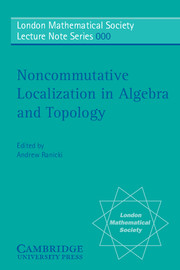Book contents
- Frontmatter
- Contents
- Dedication
- Preface
- Historical Perspective
- Conference Participants
- Conference Photo
- Conference Timetable
- On flatness and the Ore condition
- Localization in general rings, a historical survey
- Noncommutative localization in homotopy theory
- Noncommutative localization in group rings
- A non-commutative generalisation of Thomason's localisation theorem
- Noncommutative localization in topology
- L2-Betti numbers, Isomorphism Conjectures and Noncommutative Localization
- Invariants of boundary link cobordism II. The Blanchfield-Duval form
- Noncommutative localization in noncommutative geometry
- Index
Noncommutative localization in noncommutative geometry
Published online by Cambridge University Press: 19 October 2009
- Frontmatter
- Contents
- Dedication
- Preface
- Historical Perspective
- Conference Participants
- Conference Photo
- Conference Timetable
- On flatness and the Ore condition
- Localization in general rings, a historical survey
- Noncommutative localization in homotopy theory
- Noncommutative localization in group rings
- A non-commutative generalisation of Thomason's localisation theorem
- Noncommutative localization in topology
- L2-Betti numbers, Isomorphism Conjectures and Noncommutative Localization
- Invariants of boundary link cobordism II. The Blanchfield-Duval form
- Noncommutative localization in noncommutative geometry
- Index
Summary
Abstract
The aim of these notes is to collect and motivate the basic localization toolbox for the geometric study of “spaces” locally described by noncommutative rings and their categories of modules.
We present the basics of the Ore localization of rings and modules in great detail. Common practical techniques are studied as well. We also describe a counterexample to a folklore test principle for Ore sets. Localization in negatively filtered rings arising in deformation theory is presented. A new notion of the differential Ore condition is introduced in the study of the localization of differential calculi.
To aid the geometrical viewpoint, localization is studied with emphasis on descent formalism, flatness, the abelian categories of quasi-coherent sheaves and generalizations, and natural pairs of adjoint functors for sheaf and module categories. The key motivational theorems from the seminal works of Gabriel on localization, abelian categories and schemes are quoted without proof, as well as the related statements of Popescu, Eilenberg-watts, Deligne and Rosenberg.
The Cohn universal localization does not have good flatness properties, but it is determined by the localization map already at the ring level, like the perfect localizations are. Cohn localization is here related to the quasideterminants of Gelfand and Retakh; and this may help the understanding of both subjects.
Introduction
Objectives and scope. This is an introduction to Ore localizations and generalizations, with geometric applications in mind.
Information
- Type
- Chapter
- Information
- Noncommutative Localization in Algebra and Topology , pp. 220 - 310Publisher: Cambridge University PressPrint publication year: 2006
Accessibility standard: Unknown
Why this information is here
This section outlines the accessibility features of this content - including support for screen readers, full keyboard navigation and high-contrast display options. This may not be relevant for you.Accessibility Information
- 3
- Cited by
